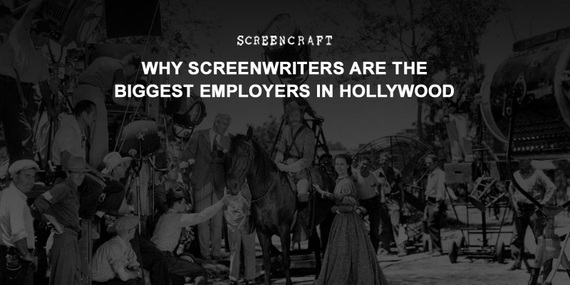
This Post originally appeared on the blog ScreenCraft. ScreenCraft is dedicated to helping screenwriters and filmmakers succeed through educational events, screenwriting competitions and the annual ScreenCraft Screenwriting Fellowship program, connecting screenwriters with agents, managers and Hollywood producers. Follow ScreenCraft on Twitter, Facebook, and YouTube.
We’ve all heard -- and some of us have experienced first hand -- that screenwriters are perhaps the most under-valued individuals in Hollywood. When a film wins Best Picture or makes a billion dollars at the box office, whose name do we hear? The star, the director, and maybe some of the high profile producers. A majority of the time, the screenwriter is somewhat anonymous amidst any of the hoopla.
This is likely due to the fact that film is a collaborative art form and business, and it all only starts with the written word.
It all gets interesting when you look at it from a different perspective, however. There’s a truth that isn’t often spoken out loud in Hollywood, or the world, as a whole. And it’s a truth that our friend, screenwriter Jim Hart (Bram Stoker’s Dracula, Hook, Contact), wrote about in this eye-opening post we found on The Hill.
But let’s first point out what it’s like being a screenwriter.
It’s hard. It’s a grind. Screenwriters struggle for the few coveted assignments. They struggle to even be in contention in the first place. They struggle to just get their scripts read so they can attain representation, which is necessary to introduce them and their writing to the powers that be in Hollywood. They are often replaced without warning or care. They are paid a fraction of what eventual directors, talent, and producers make for any given film. And yes, they also receive a fraction of the kudos when a film does well.
However, Jim Hart recently pointed out something amazingly true -- screenwriters are the biggest employers in Hollywood and beyond. A notion that has been staring at us right in the face.
In the post, Jim wisely stated the obvious:
“Let me say that with conviction. I am a job creator. Thousands and thousands of jobs are created by me and my screenwriting colleagues -- every single year without fail. Thousands. And it does not require a vote of Congress, or a filibuster, or a threat of government shutdown, or actually living up to and delivering on a campaign promise made in the heat of passion in order to get votes.“
He goes on to say:
“When a writer types THE END, it is the beginning of a process that involves hundreds of jobs and services before the script even reaches the actual production stage. Staff at the Producer's office, Studio execs, and Story execs and their staff who are employed to read, develop, finance and produce your script get to keep their jobs because of writers. Agents, Managers, Lawyers who negotiate the writer deals, all have jobs in part because of writers. Once the script goes into the production stage, the amount of jobs required to produce a film grows exponentially; crews of 100-400 and more become necessary; local vendors and merchants in the location where my script is being filmed benefit and are able to boost employment. Hotels, car rental agencies, airlines, local restaurants, stores, shops, all benefit enormously by my typing THE END.
My two screenplays of Hook and Bram Stoker's Dracula, occupied every soundstage at Sony Studios and Culver Studios, employed hundreds of crew and craf